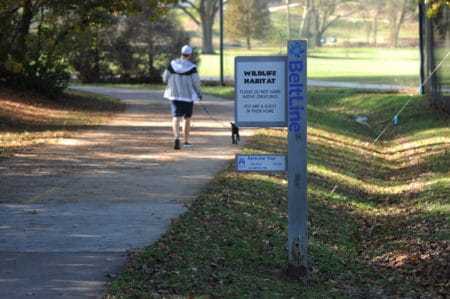Small business owners along the Atlanta BeltLine urged officials during a Jan. 28 virtual meeting to delay legislation that would create a tax overlay district to fund completion of the trail part of the loop.
Hosted by the Old Fourth Ward Business Association, the meeting was the first opportunity for business and property owners to air their opinions on the proposed special service district (SSD) that would see a 2-mill increase in taxes for commercial properties and apartment complexes located 0.5 miles on either side of the 22-mile BeltLine trail.

The legislation to create the SSD was introduced at a Jan. 19 Atlanta City Council meeting, which was the first time most residents and business owners had heard of the plan.
Councilmember Matt Westmoreland said during the meeting that the legislation would not advance until multiple public hearings were held. The City Council will hold a work session on the issue Feb. 16 at 1 p.m., while the BeltLine is planning a series of public forums in February and March.
BeltLine officials said the SSD is needed to complete the trail because the tax allocation district (TAD) created to fund construction is projected to generate $1 billion less than expected.
Councilmember Amir Farokhi said completing the entire BeltLine will be beneficial to the city, but he questioned the geographical boundary of the SSD and said he was concerned it would put Community Improvement Districts (CIDs), a self-taxing scheme that keeps improvement funds in a specific neighborhood, in jeopardy.
Nichole A. Hall, the administrator for the West End CID, said her board had “strong concerns” about the SSD’s financial impact and questioned the rush by BeltLine officials to get the legislation approved by this autumn.
“We’re already paying an additional tax,” Hall said, noting that West End business owners pay 5 mills extra into the CID. “We have concerns that this SSD will hinder our expansion and cut into revenue. And why do this now while we’re in the midst of the COVID-19 pandemic? Our business owners in West End are hurting. Could it be delayed?”
Katharine Chestnut, who owns the Alkaloid co-working space along the BeltLine, said she was not expecting her business to recover from the economic crisis until 2022. “This fall is too soon,” Chestnut said. “Businesses are suffering. Give us a chance to recover. Maybe the big property developers can suck up this cost, but we are still reeling. Please put it off for at least a year.”
Clyde Higgs, CEO of Atlanta BeltLine Inc. (ABI), the organization planning and building the loop, contended that the SSD has to be established now to beat the clock on the expiration of the TAD. He said that he had spoken to other business owners who were willing to pay the extra tax because they wanted faster completion of the trail to generate foot traffic.
Johnny Martinez, who co-owns Joystick Gamebar and Georgia Beer Garden, said neither of his businesses get foot traffic from the BeltLine, but would still be forced to pay the extra tax. Martinez said small business owners who rent their spaces would see the tax burden passed on by the property owners. Similarly, apartment dwellers would likely see an increase in their rents to cover the additional tax.
Rob Brawner, executive director of the Atlanta BeltLine Partnership, ABI’s nonprofit fundraising arm, said an estimated 3,675 properties along the BeltLine would be subject to the tax. Brawner said most luxury apartment complexes along the corridor would only see a $17 per month, per unit increase when the SSD was applied. He used the Ansley II strip shopping center across from Ansley Mall on Monroe Drive as an example of what tenants might pay, stating “the entire SSD on that entire piece of property is $950 per year.”
Single-family homes are notably absent from the SSD. Westmoreland explained taxing homes along the BeltLine is permissible under the law but were left out of the legislation as not to negatively affect legacy homeowners in gentrifying neighborhoods.
The SSD legislation also has been opposed by the advocacy group BeltLine Rail Now, which says that the loop’s light-rail transit must be funded faster and open along with the trail element to serve the public and avoid gentrification.
The BeltLine is a proposed 22-mile system of multiuse trails and an accompanying light-rail mass transit line that would encircle intown Atlanta. The transit has yet to be built, while several segments of the trail have already opened, including the Northside Trail in Buckhead’s Tanyard Creek and Atlanta Memorial parks area. Planning for the Northeast Trail segment into southeastern Buckhead is underway.
For more about this story, see coverage in Atlanta Intown.
–John Ruch contributed
